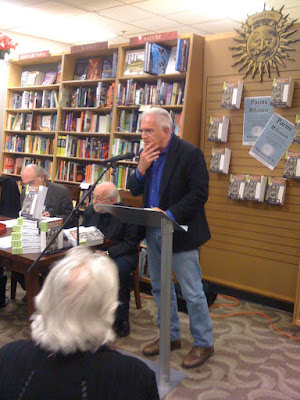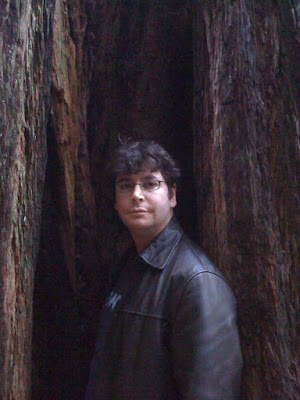
Every day Sadie is perfect. But every day she is a little more herself than she was the day before. Futurity is part of her perfection: language, verticality. We call this growing up.
A sentence I want to write: The better we think we know ourselves, the less we know of what we're capable of. This sentence may not be true; I need to invent a character to say it.
From the Wikipedia entry for Wallace Stevens: "The poet should find the words that will speak to the delicatest ear of its modern listeners, echoing what it wants to hear but cannot articulate for itself." So listeners are like children.
I am pretty much already whom I'm going to be. My futurity's at least half exhausted. Nel mezzo del cammin di nostra vita. But I can't actually know this. At any moment I might make the journey to hell, purgatory, or heaven, and not necessarily in that order.
Pointing at what she wants: something on the table, something on the ceiling, something out the window. Whining when she doesn't get it, inarticulate, disjointed.
The seeing hand. "Let me see that" means give. The talking hand (not "talk to the hand"). Crying, both hands outstretched.
A child should not mean, but be.
Her aunt gave her a wooden box with red cylinders, blue cubes, and green pyramids, and a removable lid with circle, square, and triangular openings. The idea is to put the round peg in the round hole. Sadie just takes the lid off and tosses it aside, then drops the shapes into the box, like Alexander cutting the knot.
Emily visited a Montessori school: the toddlers working quietly and diligently at their play stations, or rather playing diligently at their work stations. Then they all gathered at a table for a snack. My friend Alex says the firm boundaries established there make the child freer within themselves, later in life. It's what I tell my students about the lipograms and homophonic translations I ask them to do, though I don't say "child within."
Embarrassing how often, when trying to teach a difficult concept such as Bakhtin's authoritative speech, I resort to the example of The Matrix. "The Matrix is all around you. You can feel it when you go to work... when you go to church... when you pay your taxes." Too bad about the sequels.
Her fierceness and will, a rage boiling up from within. But language, so far, stands apart from that will. Instead it's syllabic joy: in "hat" (anything she puts on her head), in "apple" (rarely in reference to the fruit), in "duck" (not necessarily a bird that quacks). But: "up" is shifting from phoneme to morpheme, from plaything to entreaty and command.
Tonight we're meeting friends to celebrate a year of parenthood, without the object of that parenthood (we're getting a babysitter). A year in a strange country where the lights have changed. A year in which I seem to have become more porous, more easily seized by emotion. Can't think of a child's suffering now, even a fictional child, without suffering myself—is this profound or sentimental?
A year of learning to trust touch. I was recently asked, How do you hold a baby? First of all you support the head. Then you yield to the hand that seems to support you—a stark, impersonal strength that parents know. That drops you when it's done with you and leaves you breathless in front of the TV.
Standing at a nearly imperceptible distance from writing. As Sadie stands a hairsbreadth from speaking.
One strange and wonderful year down the rabbit hole, everyone seeming to fall at the same rate, but Sadie's already clutching that bottle, that cake. EAT ME. DRINK ME. Telescoping somewhere else, beyond us.
Now in the not-yet.













